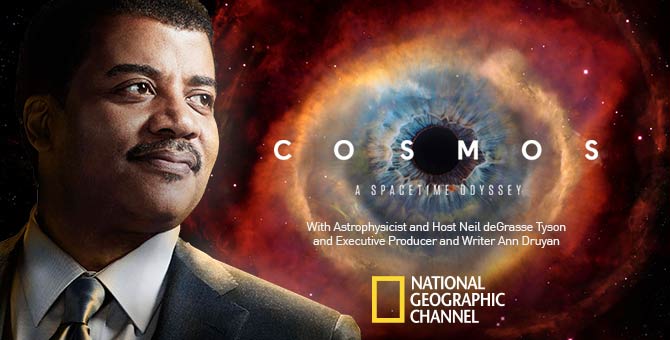Last Sunday the second episode of Neil deGrasse Tyson’s new Cosmos series aired. From the perspective of the evolution-creationism controversy, it was a doozy.

This episode, titled “Some of the Things That Molecules Do,” not only profligately used the dreaded “e-word” (evolution), but also presented a clear and succinct and visually-compelling explanation of how evolution happens. On television? In America? Hard to believe such a thing could happen in 2014, huh?
Clear explanations of science are precisely what creationists most fear from Neil deGrasse Tyson’s series. They know their spurious arguments wither in the face of any clear presentation of the facts of evolution, especially when such a presentation is made without apology, and in a way everyone can understand.
But the episode didn’t stop there, discussing the reaction to Darwin, natural selection, the evolution of the eye, the genetic commonality of all life. Even the “intelligent designer” got a shout-out. Episode two delved into red-meat issues and did so without holding back.
Creationists fumed at Neil deGrasse Tyson’s first episode, which opened with Sagan’s line defining the cosmos as “all that is,” a thought which could in a generous reading also include faith positions, but which they narrowly and self-servingly choose to interpret as excluding their own. The site Creation-Evolution Headlines declared that the “the program concentrated on imaginary realities.” The CreationScience4Kids blog recommended parents let their children watch Cosmos, but only because “one way or another, your kids are going to hear the kinds of ideas presented in the series,” and it would be better if parents were hovering close by to correct any stray offensive science kids might hear. Given the level of outrage generated by a plain explanation of non-controversial scientific information, one can only imagine how vociferous the reaction to this second episode about evolution will be.
But the predictable creationist indignation will, I think, prove to be the least important aspect of what this second episode--a wonderful and majestic explanation of how evolution works and how the diversity of life came to be--will bring. This is the sort of programming that can inspire and open minds. That will no doubt be the long-lasting legacy of Cosmos.
I can imagine science teachers around the country showing Cosmos to their pupils, sparking curiosity and understanding. I can imagine citizens sitting at home wanting to know more about the ideas Neil deGrasse Tyson introduces. And I can imagine those who as pupils were subjected by trusted teachers to unsubstantiated attacks on evolution finally coming to understand that what they were told about the “evils” of evolution is simply not true. Cosmos is the rarity that uses the tool of television for good, for a purpose higher than reruns of Honey Boo Boo.
In short, Cosmos is making creationists hopping mad. And in their over-the-top reactions to non-controversial information routinely taught in science courses all around this country and the world, one detects a whiff of a word that rhymes with manic: panic.
